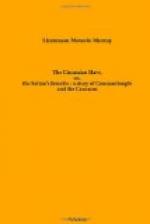“God is great!” said the officer, as he looked upon the purse with a profound reverence, astonishing the humble wanderer by the respect he showed to the jewelled bag.
“And what place is this?” he asked of the officer, as hie looked curiously about him.
“By the beard of the Prophet, young man, do you not know?” asked the official.
“I do not.”
“Not know whose purse you hold, and in whose grounds you stand!” reiterated the soldier.
“Not I.”
“Allah akbar! it is the palace of the defender of the faith, Sultan Mahomet!”
“The Sultan!” exclaimed the lone wanderer, struck dumb with amazement.
“The Brother of the Sun,” repeated the official, with a profound salaam as he repeated the name, while at the same time he noted the astonishment of the stranger.
“The Sultan,” repeated the new comer, musing to himself, “rides he forth alone?”
“At times, yes, when it suits him. No harm can come to him—he is sacred, and need not fear.”
“Perhaps not,” answered the other, as he recalled the scene on the borders of the forest.
At the singular piece of intelligence which the had received, the stranger seemed to hesitate. He surely would not have come hither had he known to whom he was about to apply for assistance. Could it be the Sultan that he so opportunely aided? If so, he surely need not fear to meet him again; perhaps he might even venture still to tell him honestly his story, and ask at least for advice in the pursuit of the object which had brought him to Constantinople. In this half undecided mood he stood musing for some minutes, and then with a struggle for resolution, bade the officer lead him to his master.
Let us look in upon the royal presence for a moment. It is a gorgeous saloon, where the monarch lounges upon satin cushions, with the rich amber mouthpiece of his pipe between his lips, and the perfumed tobacco gently wreathing in blue smoke above his head. Mahomet was at this moment seated on a pedestal of cushions, so rich and soft that he seemed almost, lost in their luxuriance. Reclining by his side was a creature so lovely in her maidenly beauty, that pencil, not pen, should describe her. Ever and anon the monarch cast glances of such tenderness towards her that an unprejudiced observer would have noticed at once the warmth of his feelings towards her, while the gentle slave, for it was Lalla, turned over a pile of rich English engravings, pausing now and then to hold one of more than usual interest before his eyes.
It was an interesting scene. The pictures had deeply interested the slave, and with graceful abandon she had forgotten everything but them; now smiling over some curious representation, or sighing over another no less truthful, and her fair, young face expressing the feelings that actuated her bosom with telltale accuracy all the while. Her dark hair was interwoven with pearls by the running hands of the Nubian slaves, and its long plaits reached nearly to her feet, while across her fair brow there hung a cluster of diamonds which might have ransomed an emperor—a gift from the Sultan himself.




